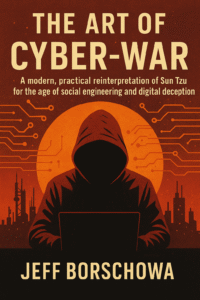Arm Yourself Against Social Engineering and Cyber Deceit

🔒 Why I Wrote The Art of Cyber-War… and Why You Might Need It More Than You Think
We’re living in a time when trust is both a superpower and a vulnerability.
If you’ve ever clicked on a suspicious email, answered a sketchy message, or felt embarrassed after falling for a too-good-to-be-true online pitch… you’re not alone. You’re human. And you’ve just experienced one of the most common forms of modern warfare: social engineering.
Let’s be clear: this isn’t just “spam” or “scams.” What we’re facing today is psychological warfare at scale. It’s personal. It’s fast. It’s invisible. And worst of all, it targets our best human traits.
That’s why I wrote The Art of Cyber-War. Not because I’m a cybersecurity expert (I’m not). But because I’m a lifelong sucker – a person who trusted too much, clicked too fast, and believed the wrong people too often. Especially online.
But after a long journey of learning (and sometimes failing), I stopped seeing the world as I wanted it to be and started seeing it as it really is. That shift changed everything.
And now? I want to help others, especially my fellow neurodivergent thinkers, make that shift too.
The Battlefield You Never Asked to Be On
Whether we realize it or not, every time we pick up our phones or open a browser, we step onto a battlefield.
There are no sirens. No uniforms. But the war is real.
This is a war of:
- Emotional manipulation
- Impersonation
- Urgency, fear, and deception
And the goal isn’t to hack your device, it is to hack you. Your brain. Your attention. Your trust.
In the book, I break down dozens of common digital attacks: phishing, catfishing, deepfakes, fake IT calls, fake invoices, QR code traps, romance scams, you name it. These aren’t rare. They’re relentless.
But here’s the twist: the smarter, kinder, or more literal you are, the more likely you are to fall for them. Because social engineering doesn’t attack your knowledge, it attacks your humanity.
Who I Wrote This Book For
I wrote The Art of Cyber-War for people like me. People who:
- See the good in others
- Don’t want to assume the worst
- Take things literally
- Feel a deep sense of loyalty and responsibility
- Maybe didn’t grow up with technology but now rely on it every day
I especially wrote this for Autistic and neurodiverse individuals because we often have unique patterns of communication, trust, and cognition that make us ideal targets for online deception.
But make no mistake, this book is for everyone. Because no one is immune. And awareness is the first line of defense.
No Jargon. No Shame. Just Strategy.
One of the reasons most people don’t learn cybersecurity basics is because the content is written for IT professionals. It’s loaded with jargon, technical terms, and an attitude of “how did you not already know this?”
That’s not helpful.
So I threw that model out the window.
This book isn’t about firewalls and code. It’s about patterns, emotions, and instincts.
You’ll learn:
- Why urgency is the #1 emotional trick used in attacks
- How deepfakes and AI are making trust harder every day
- The key red flags in messages that “just don’t feel right”
- How to spot emotional manipulation before it works
- How your brain style (especially if you’re neurodivergent) can either help or hurt your online safety
Each chapter is built on principles inspired by Sun Tzu’s Art of War because we’re not just talking about tools. We’re talking about strategy.
What Makes This Book Different
This isn’t a fear-based guide. It’s an empowerment manual.
You won’t feel paranoid, you’ll feel prepared.
You won’t feel dumb for what you didn’t know, you’ll feel stronger for what you’re learning now.
And you won’t be talked down to. You’ll be invited into the conversation.
In fact, the book opens with questions not answers. Why? Because I believe your own “why” is the best protection against manipulation. When you know why you want to stay safe, you’ll actually take action.
A Word to My Fellow “Suckers”
If you’ve ever felt embarrassed for falling for something online, please hear this:
You are not stupid. You are not naïve. You are not alone.
You were targeted because of your goodness, not in spite of it.
Scammers, hackers, and con artists study human behavior more than most therapists do. They know what buttons to push. They know how to mimic authority. They know how to twist urgency into obedience.
But you can learn their playbook. And once you see the patterns—they lose their power.
Ready to Build Your Digital Armor?
If you’ve read this far, thank you. That tells me something important: You’re ready.
Ready to move from digital anxiety to digital agency.
Ready to stop second-guessing yourself and start seeing clearly.
Ready to protect your inbox, your wallet, your loved ones—and your peace of mind.
The Art of Cyber-War isn’t just a book. It’s your shield.
It’s the training manual I wish I had before I learned the hard way.
And it’s yours now.
📘 You can find it on Amazon.com here: https://www.amazon.com/Art-Cyber%E2%80%91War-Yourself-Against-Engineering-ebook/dp/B0FKC2TBGW
🛡️ Let’s train more sheepdogs and give the wolves a run for their money.
Invitation
👉 Know someone who always says “I’m terrible with tech”?
👉 Or someone who’s been scammed before and blamed themselves?
Send them this post. Better yet, hand them this book.
Because no one deserves to walk into battle without a strategy.